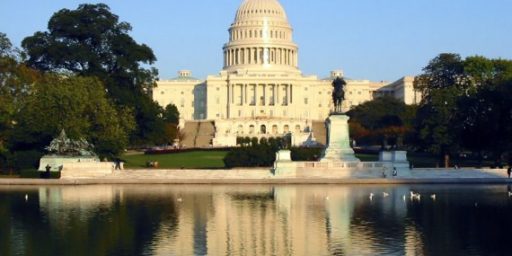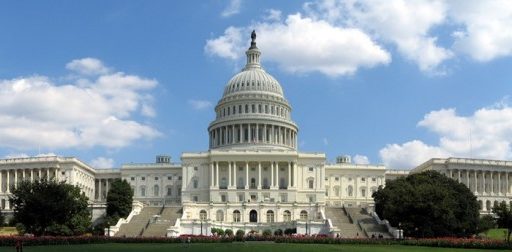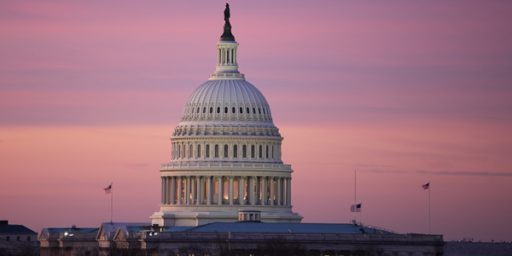Bipartisan Budget Busting
It is always easier to compromise on more spending and less taxes.
 I have noted before that bipartisanship tends to result in increased cost, because it is far easier to compromise on spending increases and tax cuts than the other way around.
I have noted before that bipartisanship tends to result in increased cost, because it is far easier to compromise on spending increases and tax cuts than the other way around.
Some specific evidence, in case you missed it via the AP: CBO: this year’s budget deficit to hit $1.5T
The latest figures are up from previous estimates because of bipartisan legislation passed in December that extended Bush-era tax cuts, unemployment benefits for the long-term jobless and provided a 2 percent payroll tax cut this year.
That measure added almost $400 billion to this year’s deficit, CBO says.
The deficit is on track to beat the record of $1.4 trillion set in 2009. That figure reflected huge outlays from the Wall St. bailout. The nonpartisan budget agency predicts the deficit will drop to $1.1 trillion next year.
Emphasis mine. That makes roughly a quarter of the deficit the result of the legislative deal struck in the lame duck session. Which, it should be noted, was one of the most popular things that either the President or the Congress has done of late.
The problem, however, is that we need more revenue and less spending, not the other way around. While I can accept the argument that given the sate of the economy another stimulus was needed (which is what this was, make no mistake), I have my doubts that responsible fiscal policy is right around the corner.






Forget the British economist’s name, but his comment today was “America has no fiscal conservatives.”
That hurts but may not be far wrong.
Oh, but wait a minute…we are told by others around here that extending the Bush tax cuts has nothing to do with our deficit problems…after all, this is the people’s money, and it is terribly wrong to assume it is the government’s…remember, only cutting spending is a part of balancing the budget…
This simple fact will not keep the right from excoriating Obama over the deficit, which is wholly, absolutely and entirely, his fault. The government’s finances were in excellent shape before he showed up. Excellent, I say!
“I have my doubts that responsible fiscal policy is right around the corner.”
Matt Yglesias has an interesting piece today, Essential Air Service. The Essential Air Service is a government program that ensures that small and rural communities receive commercial air services. The Republican budget plan seeks to cut $150 million from this program. Matt quotes South Dakota Senator John Thune in 2007 arguing that the Essential Air Service program is just that: essential.
He then goes on to write:
Which, of course, goes to the general point that folks want spending on government programs cut, but they want that program over there cut, not this one over here. And then there’s this in the Times today: Republicans Split over Plans to Cut Defense Budget.
The Republican Party, especially its new Tea Party electees, are about to have a very messy collision with reality.
“The Republican Party, especially its new Tea Party electees, are about to have a very messy collision with reality.”
Conservatives who are so happy that the president got a shellacking in the November elections should be careful what they wish for, as that turn of events is going to expose in full view the rank hypocrisy of the political party that claims to represent them and their interests…